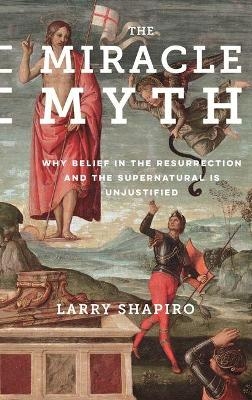
The Miracle Myth
Why Belief in the Resurrection and the Supernatural Is Unjustified
Seiten
2016
Columbia University Press (Verlag)
978-0-231-17840-2 (ISBN)
Columbia University Press (Verlag)
978-0-231-17840-2 (ISBN)
Questioning our need to believe in the miraculous and the mythical.
There are many who believe Moses parted the Red Sea and Jesus came back from the dead. Others are certain that exorcisms occur, ghosts haunt attics, and the blessed can cure the terminally ill. Though miracles are immensely improbable, people have embraced them for millennia, seeing in them proof of a supernatural world that resists scientific explanation. Helping us to think more critically about our belief in the improbable, The Miracle Myth casts a skeptical eye on attempts to justify belief in the supernatural, laying bare the fallacies that such attempts commit. Through arguments and accessible analysis, Larry Shapiro sharpens our critical faculties so we become less susceptible to tales of myths and miracles and learn how, ultimately, to evaluate claims regarding vastly improbable events on our own. Shapiro acknowledges that belief in miracles could be harmless, but cautions against allowing such beliefs to guide how we live our lives. His investigation reminds us of the importance of evidence and rational thinking as we explore the unknown.
There are many who believe Moses parted the Red Sea and Jesus came back from the dead. Others are certain that exorcisms occur, ghosts haunt attics, and the blessed can cure the terminally ill. Though miracles are immensely improbable, people have embraced them for millennia, seeing in them proof of a supernatural world that resists scientific explanation. Helping us to think more critically about our belief in the improbable, The Miracle Myth casts a skeptical eye on attempts to justify belief in the supernatural, laying bare the fallacies that such attempts commit. Through arguments and accessible analysis, Larry Shapiro sharpens our critical faculties so we become less susceptible to tales of myths and miracles and learn how, ultimately, to evaluate claims regarding vastly improbable events on our own. Shapiro acknowledges that belief in miracles could be harmless, but cautions against allowing such beliefs to guide how we live our lives. His investigation reminds us of the importance of evidence and rational thinking as we explore the unknown.
Larry Shapiro is professor of philosophy at the University of Wisconsin-Madison. He is the author of Embodied Cognition (2011), Zen and the Art of Running: The Path to Making Peace with Your Pace (2009), and The Mind Incarnate (2004), and the editor of The Routledge Handbook of Embodied Cognition (2014) and Arguing About the Mind (2007).
Preface Acknowledgments 1. Justified and Unjustified Belief 2. Miracles 3. Justifying Belief in Supernatural Causes 4. Justifying Belief in Improbable Events 5. Evidence for Miracles 6. Jesus's Resurrection 7. Should We Care That Beliefs in Miracles Are Unjustified? Appendix 1. What Is Supernatural? Appendix 2. Supernatural Causes Notes Further Reading Index
| Erscheinungsdatum | 07.10.2016 |
|---|---|
| Verlagsort | New York |
| Sprache | englisch |
| Maße | 140 x 216 mm |
| Themenwelt | Geisteswissenschaften ► Philosophie ► Logik |
| Geisteswissenschaften ► Philosophie ► Philosophie der Neuzeit | |
| Geisteswissenschaften ► Religion / Theologie | |
| Naturwissenschaften | |
| Sozialwissenschaften ► Soziologie | |
| ISBN-10 | 0-231-17840-9 / 0231178409 |
| ISBN-13 | 978-0-231-17840-2 / 9780231178402 |
| Zustand | Neuware |
| Informationen gemäß Produktsicherheitsverordnung (GPSR) | |
| Haben Sie eine Frage zum Produkt? |
Mehr entdecken
aus dem Bereich
aus dem Bereich
ein Gegenentwurf zum kurzfristigen Denken : so werden wir zu den …
Buch | Hardcover (2023)
REDLINE (Verlag)
CHF 27,90
Buch | Softcover (2023)
De Gruyter (Verlag)
CHF 34,90


